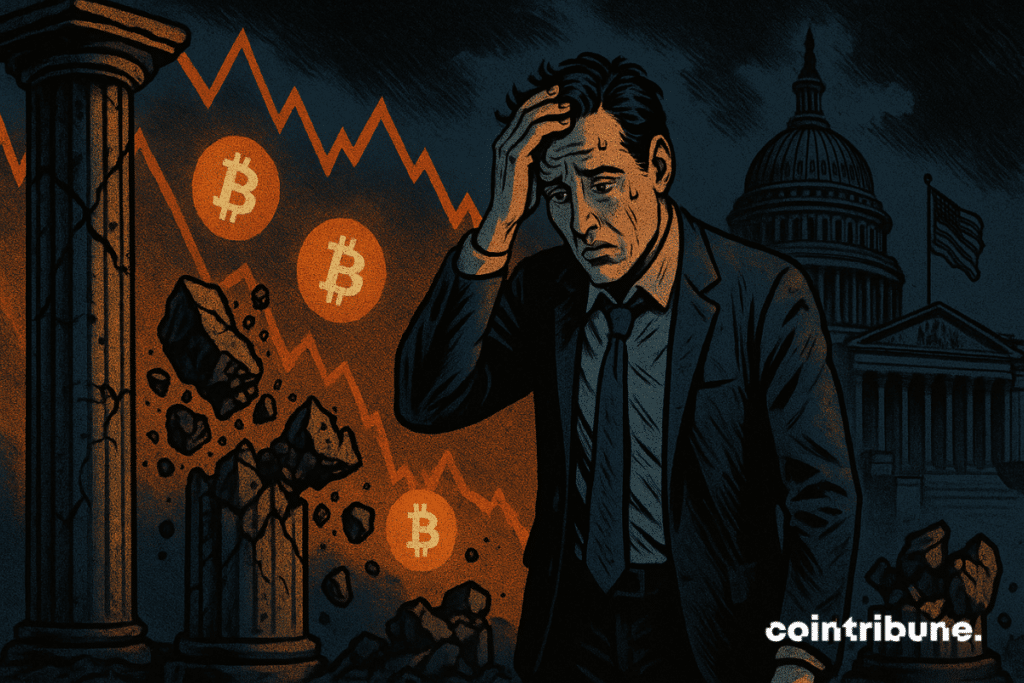36 Days of Shutdown in the USA: The Crypto Bill Threatens to Derail for Good
The U.S. government is going through the longest shutdown in its history with 36 days of blockage. This unprecedented situation directly threatens the adoption of crucial cryptocurrency legislation. The results of the midterm elections further complicate negotiations.

In Brief
- The U.S. government shutdown now exceeds 36 days, becoming the longest ever recorded in the country’s history.
- The Democrats’ overwhelming victory in the midterm election could further delay budget negotiations.
- The adoption of legislation regarding the crypto market structure, initially planned for 2025, will likely be postponed to 2026.
- Government experts on forced leave slow down the drafting of the legislative texts necessary for the bill’s progress.
A Political Deadlock That Drags On and Paralyzes the Crypto Agenda
The U.S. federal government reached a historic milestone on Wednesday: 36 days of paralysis, smashing the previous record of 35 days.
This unprecedented situation plunges the administration into chaos and directly threatens the future of crypto regulation. Lawmakers remain divided over federal budget funding, and nothing indicates a quick resolution.
The Democrats seemed ready to give ground this week. Many anticipated a government funding vote without conditions on health insurance premiums. But Tuesday’s election changed the game.
The results far exceed polling forecasts and strengthen the Democratic position in Congress. This new balance of power complicates negotiations and delays any budget agreement.
The timeline initially planned for crypto regulation is gradually collapsing. Summer Mersinger, Executive Director of the Blockchain Association, sounded the alarm on Wednesday.
She confirms that the shutdown’s extension significantly increases the risks of postponement to 2026. Public policy experts in the sector unanimously share this growing pessimism. The problem goes far beyond a simple scheduling issue.
Many government specialists capable of drafting these complex texts are currently on forced leave. Without their indispensable technical expertise, it is impossible to concretely advance legislation related to market structure. This administrative paralysis creates a major bottleneck for the entire legislative process.
Between Displayed Optimism and Ground Reality
Patrick Witt, Executive Director of the President’s Council of Advisors on Digital Assets, maintains cautious optimism.
At Ripple’s Swell conference on Wednesday, he reaffirmed Donald Trump’s position. The U.S. president still wishes to sign a final text “by the end of 2025,” despite growing obstacles.
Witt has been making frequent trips to Capitol Hill in recent weeks. He regularly meets Republican and Democratic senators to “move things forward.”
His political agenda intensifies even as the federal administration remains paralyzed. Paradoxically, he considers that the shutdown presents some unexpected advantages for his lobbying work.
“We’ve had the chance to really engage with offices, staff, and members on the substance of this bill,” he explained to CoinDesk TV.
Administrative paralysis frees up legislators’ time. These in-depth exchanges would have been difficult under normal circumstances, overwhelmed by multiple competing priorities in Congress. The White House organizes regular meetings to maintain pressure.
Industry professionals show divergent opinions. One first public policy expert believes that an improvement to the market structure “by Thanksgiving” remains possible.
A second is much more reserved. The adoption of comprehensive legislation before the end of 2025 seems “unlikely” to him. He rather expects a vote by both chambers of Congress during 2026.
Gracy Chen, CEO of Bitget, offers a more philosophical analysis of the situation.
We view the record 36-day shutdown of U.S. administrations as a temporary setback that highlights the value of resilient and decentralized systems.
For her, this crisis “could ultimately create momentum in favor of reform by highlighting the inefficiencies of traditional financial systems.”
A Race Against Time
The political context dangerously complicates the legislative equation. Senator Thom Tillis reminded recently that the window of opportunity will close by February 2026 at the latest. After this critical deadline, the midterm elections will turn Congress into an electoral arena. Any bipartisan consensus will then become almost impossible to achieve.
This harsh reality explains the urgency displayed by Republicans. John Boozman, chairman of the Senate Agriculture Committee, is actively negotiating with his Democratic counterparts.
His objective remains clear: to present “very soon” a bipartisan bill acceptable to all. The Senate banking committee has also initiated promising talks in recent weeks.
Brian Armstrong, CEO of Coinbase, recently made a strategic tour in Washington. He met several key lawmakers from both parties. His findings reignite hope within the industry.
The Senate reportedly found common ground on “about 90%” of crypto-related issues. This unexpected convergence could speed up the legislative process if the shutdown ends quickly.
Meanwhile, the SEC is operating with drastically reduced staff. The regulatory agency had to postpone reviewing several crypto ETF applications. Sixteen requests remain pending, involving major assets like XRP and Dogecoin. The industry eagerly awaits the end of this administrative paralysis to unblock these procedures.
Maximize your Cointribune experience with our "Read to Earn" program! For every article you read, earn points and access exclusive rewards. Sign up now and start earning benefits.
Passionné par le Bitcoin, j'aime explorer les méandres de la blockchain et des cryptos et je partage mes découvertes avec la communauté. Mon rêve est de vivre dans un monde où la vie privée et la liberté financière sont garanties pour tous, et je crois fermement que Bitcoin est l'outil qui peut rendre cela possible.
The views, thoughts, and opinions expressed in this article belong solely to the author, and should not be taken as investment advice. Do your own research before taking any investment decisions.